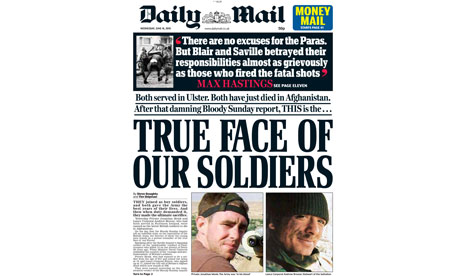Free market ideology centres on the belief that state interference in (ie regulation of) business and 'the markets' is negative and will harm business interests and economic growth. This is central to the right-wing ideology, though all three of our major parties today, including the supposedly left-wing Labour, follow this ideology.
This is also the dominant ideology of our press: 6 of the 9 main national dailies are right-wing.
The classic narrative or history of press regulation centres on one key point: that we only gained a free press when free market conditions were introduced; the ending of the stamp duty, in creating a free market, finally meant that the press were truly independent from government and politicians, and could now fulfil the central democratic role of a 'fourth estate' holding politicians and governments to account.
Curran and Seaton (and Chomsky and Herman, with their propaganda model) argue this is an intentional misreading of what actually happened - and what was intended to happen. They argue that this supposed 'free market' was explicitly designed to favour right-wing views, quoting from parliamentary debate to evidence this (politicians of the time were explicit in their aims to prevent or discourage the poor/working class from reading or publishing newspapers, and doing everything possible to stymie the then-healthy and strong radical, leftist press). Advertisers became the de facto regulators of this 'free market', and remain so today, with rising production costs meaning that only the wealthy could aspire to publish a newspaper (today, it would cost close to £100m to launch and fund a new national daily paper for a year).
Despite this, broadcasting regulation was initially very strict: after the BBC's monopoly was broken with the creation of ITV, the scheduling and programming of ITV was very, very tightly controlled by the regulators (ITA, then IBA) who had a hands-on role that is scarcely imaginable today. The regulators acted like channel managers would today, intervening if they didn't like the scheduling or mix of programmes.
Although Thatcher would famously rig the free market to punish an ITV company (Thames) that dared to defy her and introduce strict censorship laws over the issue of coverage of Northern Ireland (the 1988 Broadcasting Ban), her election in 1979 marked the start of a gradual dregulation. Thatcherism centred on free market beliefs, and piece by piece, continued by Labour, broadcasting regulations would be relaxed, and the restrictions on ITV companies (their ability to merge, plus PSB requirements) were relaxed. The ITC would be launched as a 'light touch' regulator, and OfCom was explicitly introduced with a core aim written into its own regulations of deregulation. In both cases, the idea of creating a 'national champion' capable of competing with US conglomerates was cited as a key factor.
There have been a few bumps along the road, however: much to the outrage of the Tories in Opposition (ie when Labour were in government), OfCom expanded its role to launch its own investigations and suggest new legislation on a wide range of media issues, while the 1986 Peacock Report famously shocked Thatcher by failing to recommend privatisation of the BBC, or scrapping the license fee in favour of ads.
